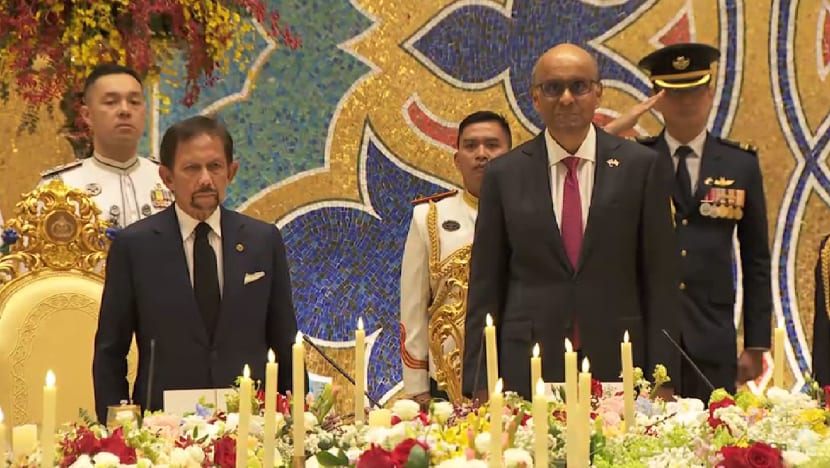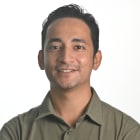‘Active foreign policy’ ensures Singapore’s interests are served amid global uncertainty: President Tharman
Mr Tharman was speaking to reporters on the sidelines of a three-day state visit to Brunei that ended on Friday - his first overseas state visit.

Singapore's President Tharman Shanmugaratnam (right), pictured with Brunei's Sultan Hassanal Bolkiah, praised the warmth and hospitality he received during his three-day state visit to Brunei, which ended on Jan 26, 2024.

This audio is generated by an AI tool.
BANDAR SERI BEGAWAN: Singapore needs an active foreign policy, with constant engagements with other countries, to ensure its national interests are served amid global uncertainty, President Tharman Shanmugaratnam said on Friday (Jan 26).
This allows the country to express its views as well as keep up and update relationships, he added.
Singapore does this with the largest players such as the United States, China, the European Union and India, as well as those in the region. The engagements are done at many levels, from political leaders and senior officials to business professionals.
“As a small country, it matters more than for most to have that active foreign policy. Not expecting to shape the world as you think it should be but making sure that we can serve Singapore's interests as the world around us gets reshaped,” noted Mr Tharman.
INTERACTING WITH COUNTRIES AS THEY EVOLVE
Mr Tharman was speaking to reporters on the sidelines of a three-day state visit to Brunei that ended on Friday - his first overseas state visit.
“The world order is gradually being eroded and is splintering. We have to take the world as it is,” he said.
“We are very small. We express our views, stand by our principles, but we have to learn to interact with countries as they evolve. And they don't always evolve in a direction we may think best but that's not ours to decide.”
Mr Tharman said he intends to be an “active” head of state, furthering Singapore’s interests abroad through his presidential duties and non-traditional roles such as chairing international bodies.
“Nothing I do is for private interest,” said Mr Tharman, adding that there may be some roles where he has to express independent views.
“The term ‘private capacity’ that's used in the Constitution, is a bit of legalese, but it simply means that there are some roles I could play internationally where I have to express independent views, so that we are credible when I'm chairing various bodies, for instance.
“They are all in furtherance of my presidential duties and the national interests. That’s the basis on which Cabinet decides on which bodies I should play a role in and it's working well so far.”
SHARING A SPECIAL RELATIONSHIP
Mr Tharman praised the warmth and hospitality he received during the state visit to Brunei, adding that both countries also exchanged views on many matters.
He said Singapore and Brunei share “a special relationship” that rests not just on strategic considerations or common strategic interests, but one that “has always rested on personal relationships”.
This started with former prime minister Lee Kuan Yew and the late Seri Begawan Sultan Omar Ali Saifuddien, father of the current Sultan Hassanal Bolkiah, and the relationship “has been renewed ever since by successive leaders in Singapore”, he added.
“So the personal relationships really matter. Because at the end of the day, it's a relationship of trust.”
Mr Tharman said Singapore’s leaders will build on these personal relationships that have bonded both sides. He cited the Young Leaders’ Programme - for young Singaporean and Bruneian leaders to interact and build ties with one another - as an important platform for doing so.
“We are very clear about the importance of not just continuing with past practice, but adapting as times change and developing new relationships.”
During the state visit, Mr Tharman was accompanied by his wife Jane Ittogi Shanmugaratnam and a delegation that included National Development Minister Desmond Lee, as well as Minister in the Prime Minister’s Office and Second Minister for Foreign Affairs and Education Maliki Osman.
Dr Maliki said: “We want to continue to see how best we can work together with Brunei because, I think as the two smallest states in ASEAN, it is important for us to understand and appreciate each other's constraints, each other's challenges. And because we go through the same challenges and constraints, we can work together."
Both sides have identified emerging areas where they can work together closely, such as renewable energy and digital finance.
Singapore and Brunei celebrate 40 years of diplomatic relations this year, with various initiatives expected.
Mr Lee said: “Ties need to be cultivated, and we need to continue to refresh the relationship because it's in both Singapore's and Brunei’s interests. But also, it enables us to collaborate on the basis of trust in many, many areas.”


















